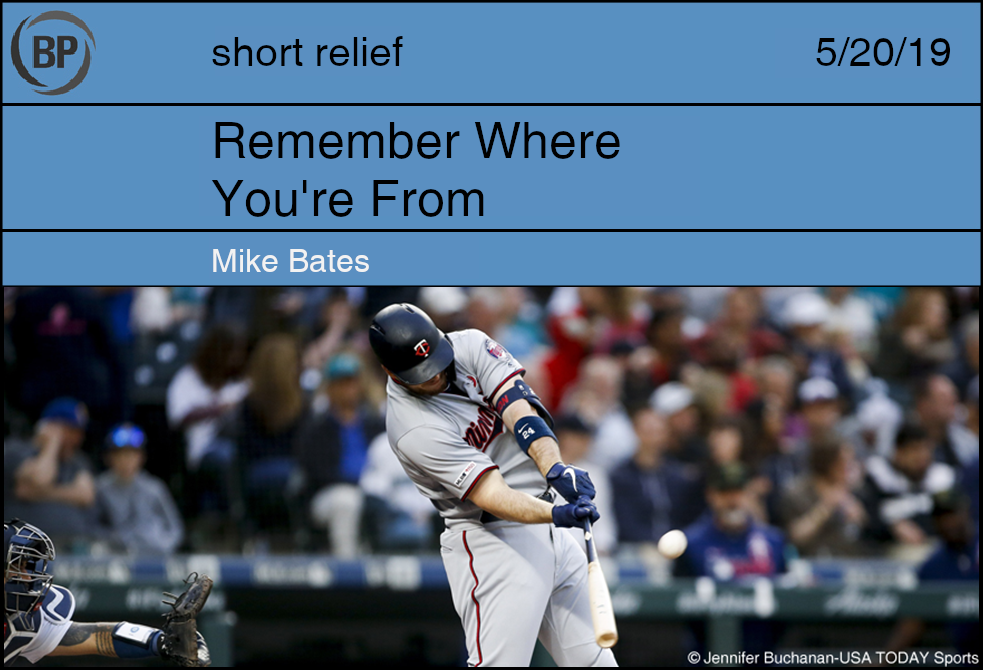
Frankly, it’s embarrassing to watch the Minnesota Twins hit juiced-ball aided home run after home run. It’s unseemly. Gauche. It is not how these things are done. Not around here.
For decades, the club was too modest to hit too many home runs. They were nice when they happened and all, but discerning Twins fans know that it’s ostentatious to seek them out and flaunt them. Better to content yourself with a double out of blatantly transparent false modesty. We do not need home runs. We are better than that.
Oh sure, there were times when the Twins eschewed best practices and gave in to the sexy seductions of the home run. The Twins of the Sixties had Harmon Killebrew, Tony Oliva, Bob Allison, Jimmie Hall, Don Mincher, and Earl Battey, all of them capable of hitting the long ball. And from 1986-1988, the club wallowed in the power hitting of Kirby Puckett, Kent Hrbek, Gary Gaetti, and Tom Brunansky. But, aside from those unseemly deviations, the team has rightly seen home runs as an afterthought.
Until now. Under Derek Falvey and Thad Levine and their phalanx of data-crunching out-of-towners, the Twins have embraced the home run. They’ve already hit 87, tied for most in Major League Baseball as of Sunday morning. That is more than they hit during the entire 1976 and 1978 seasons. The new braintrust have brought in powerful sluggers like Nelson Cruz, C.J. Cron and Jonathan Schoop to be a bad influence on our nice boys. Why, Eddie Rosario has hit 13 home runs. Max Kepler has nine. Jorge Polanco has hit eight. The three-headed catcher attack of Mitch Garver, Jason Castro and Willians Astudillo have combined to swat 17. And because of this, the team is now leading the majors in runs scored.
But they didn’t come by such numbers in any way befitting a Minnesotan. All things in moderation, as my Swedish grandmother used to tell me while also imploring me to eat more of her chocolate chip cookies.
Alas, the Twins have forgotten this important lesson. The ‘78 team may have only won 73 games, but at least they did it with a modicum of humility. And we fans may have been unhappy, but that disappointment built character. The current iteration of the club may be winning two games for every loss, but should at least have the decency to do it without showing off. Winning on the field, of course, is nice, but it’s far more important to feel superior off of it. If they continue on their present course, they may still be the Twins, but the 2019 squad will never be Minnesota.

A brown speckled sparrow nabs crumbs at an empty gate. From time to time, as the terminal shuttle passes, another songbird will dart from the airport’s arcing ceiling and the chatter of small songs murmurs beneath the tinny announcements.
There’s a dark-eyed junco in a potted ficus. The bird is real, the tree is not. There are many birds here in the McNamara Terminal of the Detroit Metropolitan Airport, and many fake trees. On the ficus’s bole, people have drawn faces and written their names in Sharpie, in pen—in the airport in 2019, no one imagines an implement that can carve. The silver flash of knives at even the nicer concourse restaurants reveals itself as plastic coating. But the fragments of muffin, the seeds fallen from a bagel, a sugar cookie abandoned on a chair—all this is real. A fountain bubbles further on. Do the birds miss the open air? Do they delight in the sweet temperance of central air and heating? No foxes. No feral cats. No wind or rain or deep-winter chill. Does their world feel narrow and long and stoppered at both ends, or is this all the space a bird the size of a rosin bag and the weight of a packet of sunflower seeds could need?
***
In the late innings of a Thursday afternoon baseball game in Philadelphia, birds come and go across the stadium sky. Their needs are met, too: French fries, fragments of hot dog bun, crackers brought from home. Gulls wheel, not far from the wide, slatey blue of the Delaware River, leading to the sea, all of them free to flit and glide where they please. And baseballs fly past the edge of the circumscribed green, over the fences, pecking the concrete of the first and second deck near spilled peanuts and discarded popcorn. Several men stand in succession on the lifted loneliness of the mound, watching the balls soar, and think of how big the world is, how small this place in comparison, and wish they could fly away, too.
Thank you for reading
This is a free article. If you enjoyed it, consider subscribing to Baseball Prospectus. Subscriptions support ongoing public baseball research and analysis in an increasingly proprietary environment.
Subscribe now